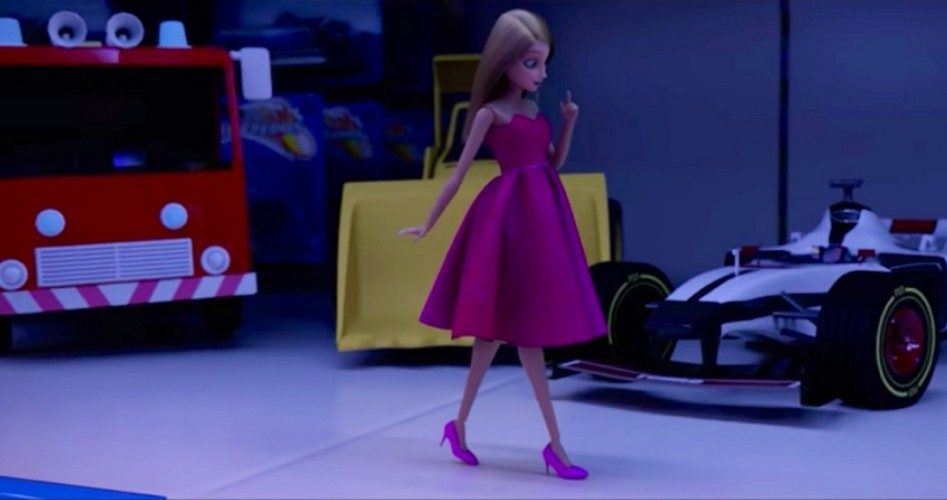
The Left believes that a person’s sex is fluid and is not based on biologiy despite either common sense or scientific evidence to the contrary. As such, it has been advancing an agenda to eliminate any and all vestiges of “gender stereotyping” and is now targeting children’s toys for the same purpose.
A commercial by Audi Spain delivered a message about gender-neutral toys in a car ad. The animated commercial was posted on YouTube on December 17, just in time for Christmas.
The commercial (see the YouTube video below) features a closed toy store, which has a pink aisle and a blue aisle. A female Barbie-like doll decides to ditch her pink carriage and opt instead for a fast blue car on the blue side of the store. As she drives through the store, she sees some of her fellow toys also switching sides and engaging in behavior that defies gender stereotypes, such as a buff male doll sipping coffee at a café on the pink side of the store and female dolls kicking around a soccer ball.
At the end of the commercial, the store is open once again for business, and a little boy finds the blue car, which still has the female doll inside. The boy asks his mother if he can have the car, but his mother, noticing the doll inside responds (in Spanish), “But darling, they don’t go together, do they?” and places the female doll back on the shelf near her pink carriage.
The boy grabs the car and decides to grab the female doll as well. A caption comes on the screen that reads, “Because playing, like driving, should not be influenced by gender stereotyping. Let’s change the game this Christmas.”
The final message is so heavy-handed it almost comes as a surprise because up until then, one can argue that the commercial’s message was just subtle and innocuous enough to be acceptable. The commercial initially seemed to target potential female consumers and ask them to shirk stereotypes regarding the type of vehicle they should drive, that is, until the final scene with the little boy, who is not old enough to purchase a vehicle, and the caption. It is a seemingly unnecessary addition and distracts from the commercial’s primary goal, which is presumably to sell a car.
As noted by the Daily Wire, this type of message about gender stereotypes and fluidity has become prevalent of late. Last year, for example, Target announced it would stop placing gender labels on its toys.
And this past spring, the White House hosted a summit on the dangers of gender-specific play. Attendees included scholars, activists and representatives from companies such as Disney, Lego, and Mattel.
Valerie Jarrett, a senior advisor to President Obama, opened the summit by telling attendees that “changing culture is not necessarily easy and doesn’t happen overnight, but we can do it if we work together.”
Unfortunately for those behind the agenda, the science does not point to the notion of gender fluidity. Writing for The Federalist, Christina Hoff Sommers, a resident scholar at the American Enterprise Institute, reminds us:
A 2012 cross-cultural study on sex differences confirmed what most of us see: despite some exceptions, females tend to be more sensitive, esthetic, sentimental, intuitive, and tender-minded, while males tend to be more utilitarian, objective, unsentimental, and tough-minded…. Among our close relatives such as rhesus and vervet monkeys, researchers have found that females play with dolls far more than do their brothers, who prefer balls and toy cars. It seems unlikely the monkeys are acting out a culturally manufactured gender binary.
A study from academics at City University London and UCL also found that children as young as nine months old prefer to play with toys specific to their own gender.
Dr Brenda Todd, a senior lecturer in psychology at City University, said of the findings:
Biological differences give boys an aptitude for mental rotation and more interest and ability in spatial processing, while girls are more interested in looking at faces and better at fine motor skills and manipulating objects. When we studied toy preference in a familiar nursery setting with parents absent, the differences we saw were consistent with these aptitudes. Although there was variability between individual children, we found that, in general, boys played with male-typed toys more than female-typed toys and girls played with female-typed toys more than male-typed toys.
Likewise, according to a report published in The New Atlantis earlier this year, science does not support the separation of gender and biology. The report was co-authored by former Chief of Psychiatry at Johns Hopkins Hospital and Distinguished Service Professor of Psychiatry at Johns Hopkins University Dr. Paul R. McHugh and Arizona State University professor of statistics and biostatistics Lawrence S. Mayer. They concluded that “gender identity” is not separate from biological sex.
A position statement released by the American College of Pediatricians (ACPeds) on March 21 entitled, “Gender Ideology Harms Children,” asserts that human sexuality “is an objective biological binary trait,” and that fostering any believe to the contrary is harmful to child development.
But that has not stopped the left from forging full steam ahead with its agenda. Conservative pundit Ben Shapiro offers an explanation for the motivation behind the agenda:
The left’s desire to beat sex differences out of children is part of their generalized quest to substitute sameness for equality. In the end, they only end up hurting children whose parents are too foolish to ignore cause-driven parenting in favor of decent parenting. There’s nothing wrong with a girl wanting a truck for Christmas or a boy wanting a doll. But the left believes the boy must be pushed into wanting the doll for the sake of social justice. That’s stupid, crazy, and scientifically backwards.
Fortunately, the majority of Americans do not believe that all toys should be marketed to both boys and girls, with just 28 percent asserting that they should in a 2015 market study on the issue. However, 40 percent of millennials responded that they believe that the toy industry should market every toy to boys and girls. While that number is frighteningly high, it seems safe to assume that their view will change once they have children of their own and observe what researchers at City University London discovered.
Graphic at top: sreen-grab from Audi ad




